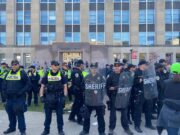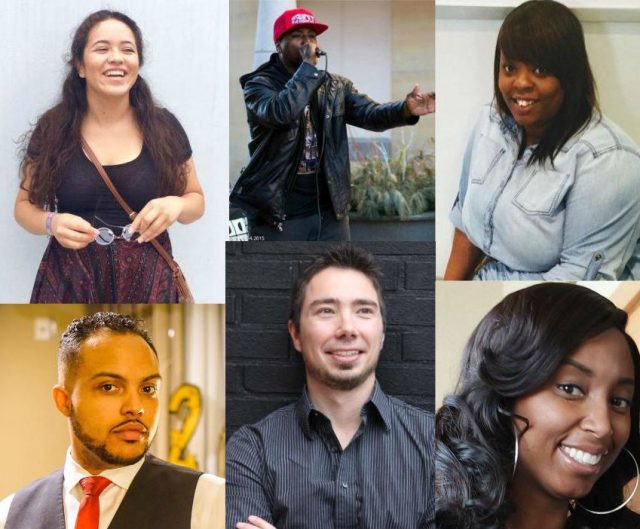Here are some of our favorite 12 on Tuesday answers from the past few months.

Pastor Josh Miller. What’s the biggest stumbling block in Madison to turning the corner on our racial disparities? We don’t listen to each other. Instead, we argue and shame others into acting how we personally believe they should. The only way out of this mess is to commit to listening to the voices we have long marginalized, to ask more questions and offer less trite solutions, and commit to doing it together.
Your Church, The Bridge, adopted Leopold elementary school. Why did you decide to adopt Leopold School? It was the door God opened. When we started in Madison, we knew schools were a priority partnership, and we had been praying over the 53713 zip code. We reached out to the school district, and they put us in touch with Mary Bartzen and the Foundation for Madison Public Schools. Leopold had a budding group of partners, and she suggested we start with them. Four years later, we’ve hosted crock-pot cooking classes, built a book garden, helped other organizations adopt classrooms, and a whole host of other activities.

Lupe Salmeron, Madison365 Academy student. What does it mean to be Latina in Madison? Being a Latina in Madison means to be a warrior and survivor. We’re warriors because we’re fighting a different battles every day. We’re held to ridiculous expectations, undermined and often times exploited in our workplaces. The negative stereotypes placed on us by society haunt us everywhere we go, so we have to educate other on our realities.
We’re survivors because we’ve survived our everyday battles, among other major battles. Some of us have jumped a border, or two or three several times to have a shot at the delusional American dream. Others of us have fought against anti-immigration legislation threatens our tight-knit communities. Others of us have fought education systems to get the education we deserve. Although our battles have been different, we have all survived them and are around to tell them.
Most importantly, being Latina in Madison means to be orgullosa de mi patria y de mi gente (proud of my country and my people) because thanks to our will and resilience, we are spreading our heritage and showing others what being Latinx really is.
Why is it important for Latinx young people to support Black Lives Matter? As Latinx we have the responsibility to help our black brothers and sisters out, especially in their time of need. We need to come together to show other Latinx that this movement is as equally as important as the immigration movement. Too many negative stereotypes and prejudices exist within the Latinx community, especially within older generations. They stand in our way and often times discourage people from becoming involved in protests and demonstrations. In order to combat the negative stereotypes and prejudices, we must fight together.
Both our black brothers and sisters and we are living in a country, growing up in institutions and systems that were not built for us, so we both know what it’s like to be oppressed and ignored by those in power. We must stand together and show the doubters that we are one, regardless of race and immigration status. We must also show them that we will not allow any of our people to be beaten down and forgotten once again. By lending out a hands to our black brothers and sisters and helping them fight this battle, they will lend a hand during our time of need.

Anthony Ward, Nehemiah Center for Urban Leadership Development. Name your top 5 local MCs.
- Keon Andre
- DLO
- Rob Dz
- Laduma
- P Swagger aka Mr 747
As a former police officer, what advice would you give to police officers when dealing with communities of color? In order for any advice I have to offer to be received, I would recommend officers take a self-assessment to determine whether they are coming into the job truly caring for all people and their well being. Some join because the benefits are great, or they want to catch the bad guys, or they like the power it gives them over others. The motivation behind why any individual has made the decision to serve and protect will greatly impact their interactions with communities of color.
The things that officers experience can cause them to become hard and ultimately burn out, and the community suffers as a result. Put any person who truly cares for people in a uniform and watch how they positively impact the people they serve.
So my advice to cops would be to remember that you will encounter people at their lowest moments, but this does not define them. Your interaction could and should be to uplift, and reinforce negative treatment.
I was called a Nigger frequently while I was in uniform and I realized, a badge would never make a person who couldn’t see my humanness respect my office. As officers, citizens know when you don’t see their humanness, especially in communities of color who have historically suffered at the hands of law enforcement. The intentional decision to demonstrate humanity is a start to more positive interactions with communities of color. This question has multiple layers, but this is a small way I can articulate a first step in the direction of promoting more positive interactions between law enforcement and communities of color.

Ronnicia Johnson-Walker, Boys and Girls Club of Dane County. Name three things Milwaukee and Madison have in common when it comes to people of color. People of Color have been able to “create” their own space (through organizations, social groups and even festivals), which I believe is magical and beautiful.
I believe that both Milwaukee and Madison are both just beginning to truly diversify their work places (leadership) for people of color.
Milwaukee and Madison are both facing a “brain drain” amongst people of color. I continue to see people of color who attend college and gain great career experience in both Milwaukee and Madison who then leave WI all together. I have seen the impact in both Milwaukee and Madison. Many people of color (especially younger people) relocate south, instead of giving back to the communities that assisted in their success. The question becomes, what can we do, both in Madison and Milwaukee to draw more people of color to these areas to stay? Many people of color in Milwaukee and Madison will receive their degrees from UW-Madison or Milwaukee and seek employment elsewhere.
Why did you join a sorority? I joined a Sorority for a number of reasons. I joined a sorority because I wanted to be apart of something that was bigger than “me.” Historically Black Sororities are internal, and I do not think there is a larger “reach” than that. Also, I dont have siblings close in age, and felt that being apart of a Sorority would allow me to not only serve the community with like-minded women, but I would be able to call these women my sisters for life! Becoming a woman of Delta Sigma Theta Sorority, Inc and continuing the work of our illustrious 22 founders is one of the best decisions I’ve made in life.

Musician Anthony Lamarr Brown. What’s the biggest stumbling block in Madison to turning the corner on our racial disparities? Pride. C.S. Lewis called it “the great sin”. Pride was the first sin and has been the root of all of our problems world-wide. If the city of Madison, and the citizens who occupy the space, would move collectively and completely towards humility, we would not just turn the corner on our racial disparities, but we would obliterate the notion altogether.
Your album Jump Start the Soul has a mixture of piano and strings backing a hip hop track. How would you describe your music and who influenced your musical style? My music is current, contemporary, in the moment. It would be considered “Pop” music, as is all music right now. My musical influences range anywhere from the classical greats like Mozart, Beethoven, Haydn, Prokofiev, etc., to James Brown, The Temptations, Miles Davis, Frank Sinatra, Marvin Gaye, Michael Jackson, Daft Punk, Adele, Fleet Foxes, Raphael Saadiq, Timbaland, Justin Timberlake, CeeLo Green/Gnarls Barkley, Esperanza Spalding, Andre 3000, NEEDTOBREATHE…

Kesha Wilkinson, Impact Movement. You’re the campus coach for the faith-based organization Impact at UW-Madison. It’s a similar organization to Intervarsity and Cru, but focused on people of color. Cru and Intervarsity have a lot of students on staff. You are the only staff for Impact, which is mostly volunteer-run. Why do you think you have so many challenges fundraising when the other Christian organizations are thriving on Campus? Has that impacted reaching people of color on campus? The challenges lie in the differences in culture. In the black church, a black missionary is not really heard of. In many cases, what you do for God is in the church and in the surrounding community. You don’t give to Para-Church ministries like The Impact Movement. You give to the church and only the church. So when I enter these spaces, many times I am faced with a lot a push back instead of support.
Although this idea of giving towards missions in the white church is more common, I am still faced with a lot of push back. When I seek funds from white Christians I am faced with people that don’t understand the importance of a ministry that is specifically for students of African Descent. Ministries like Cru and Intervarsity are very white culture focused. When black students of the Christian faith enter a predominantly white university they are faced with the struggle of deciding to be a part of the Christian community that is mostly white or the black community. In many cases, black students choose the black community. Impact is the only place where students can fully be themselves, Black Christian students.
White Christians don’t always understand this struggle and the importance of having a ministry like Impact. Many times I am faced with questions like Why just black students? Hasn’t God called us all to be in fellowship and community? And Yes, God has called us to be in community with all but unfortunately the spaces that are created for all students doesn’t have students of color, including students of African descent, in mind when developing programming to reach students for Christ. When the only option is Cru or Intervarsity, black students miss out on a great opportunity to grow and encounter Christ.
Being from Milwaukee, give me two ways Madison and Milwaukee are different and two ways they’re the same. Unlike Madison, Milwaukee has many opportunities for Black people. There are more job opportunities, resources, communities, etc. Although Madison doesn’t have as many opportunities as Milwaukee, the thing that I have learned to love about Madison is that the size allows for more connection, which creates a greater opportunity to impact the city in a greater way.
Both cities have major racial disparities as well as people that seek to be a part of the change that needs to happen.




























